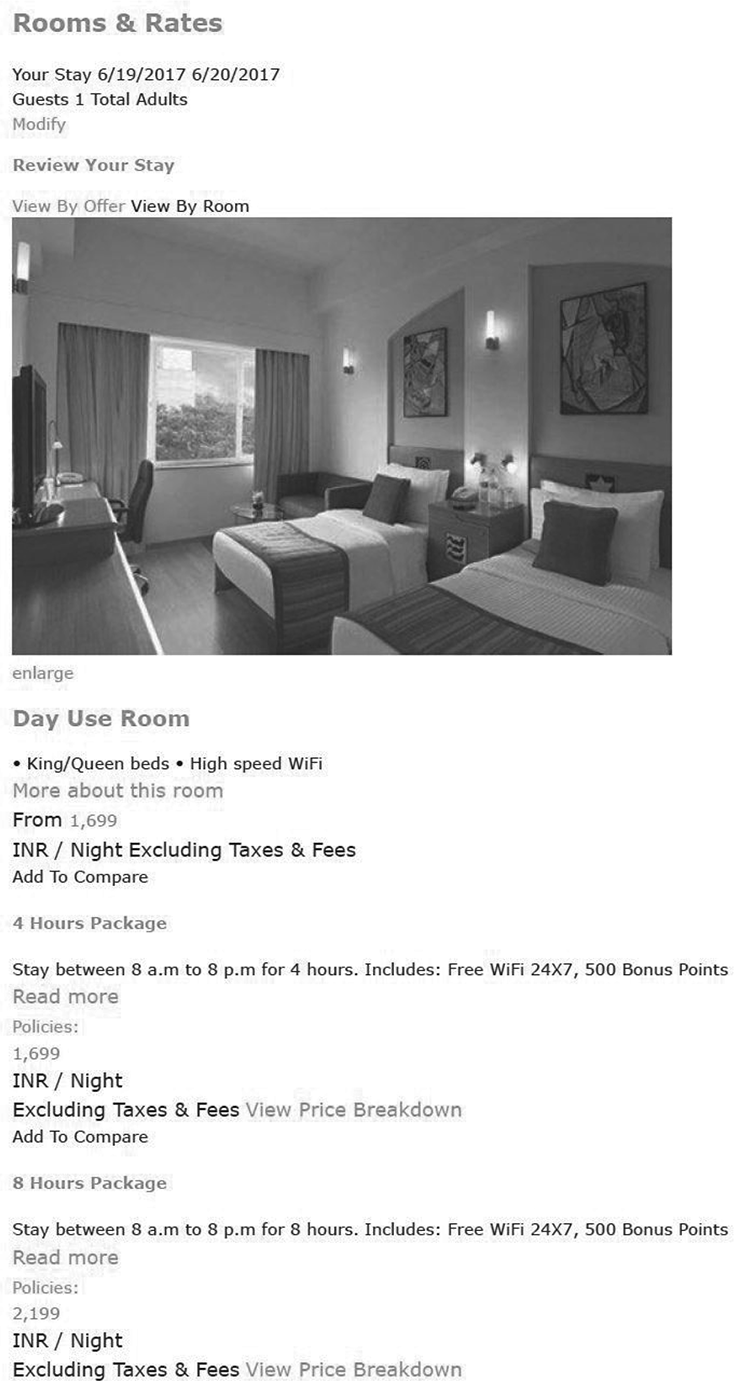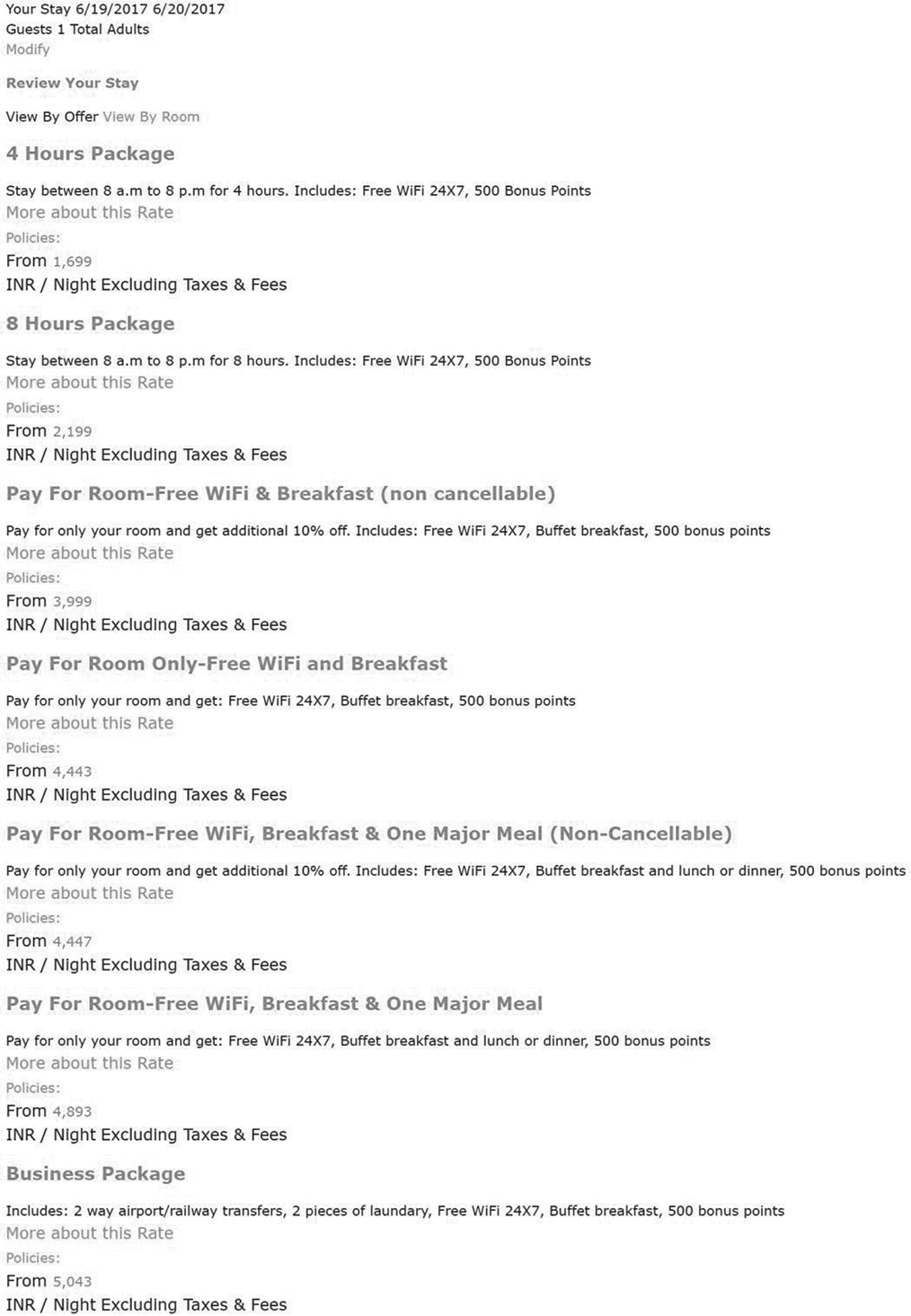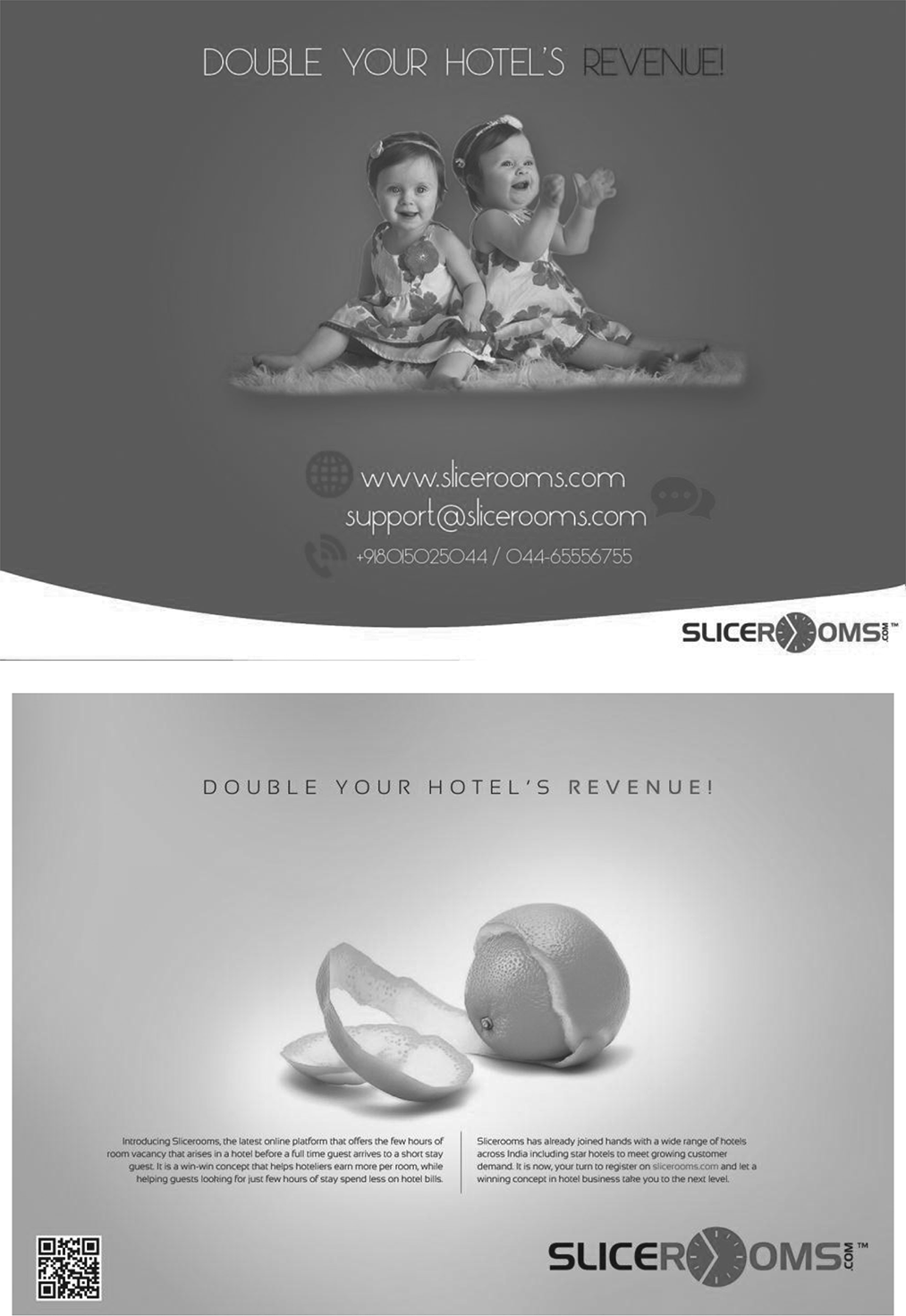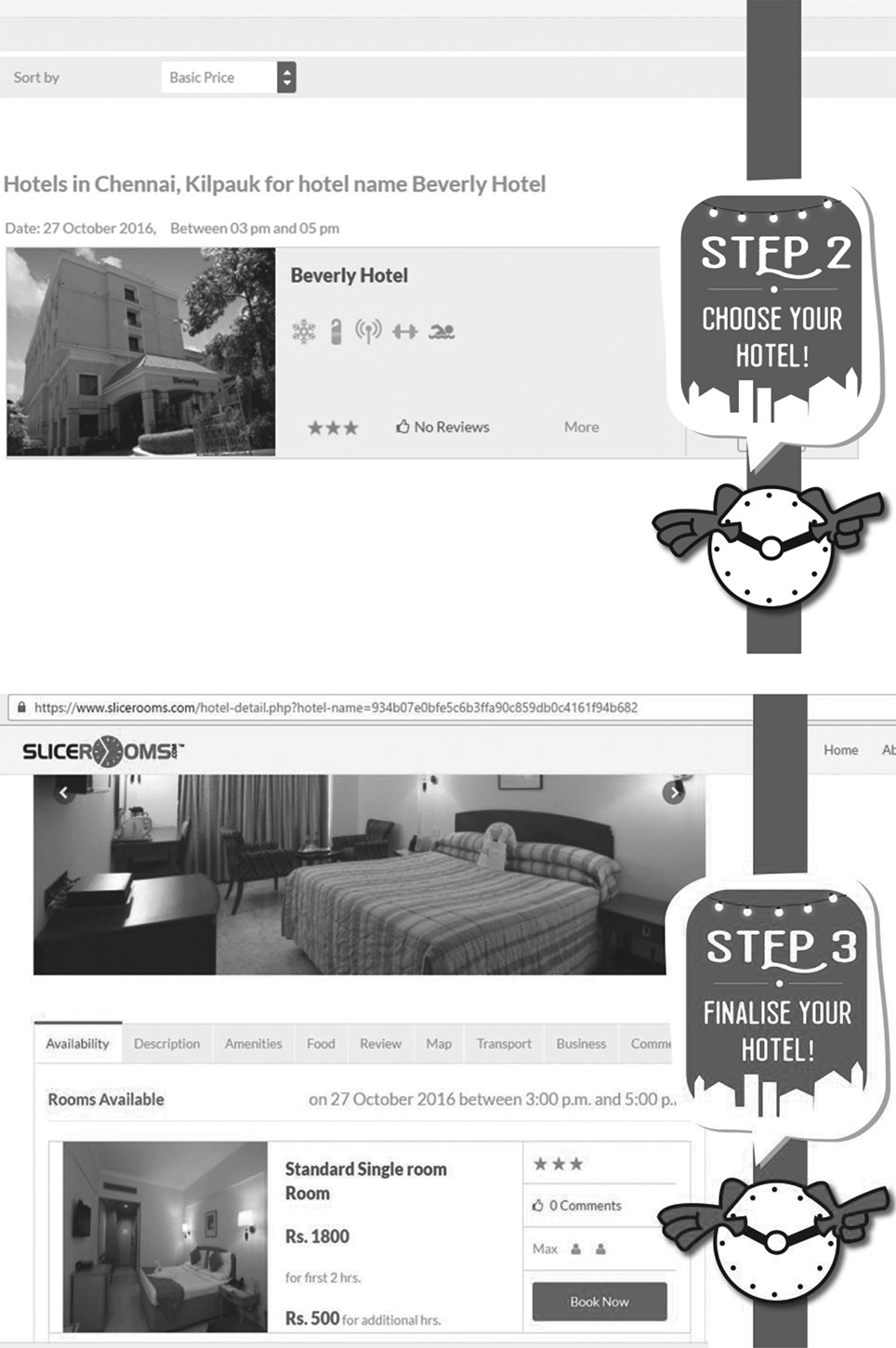CASE 16
SliceRooms: A Slice of Time, a Cut of Profits!
“I usually travel to Delhi and Mumbai for impromptu meetings which may be for two to three hours. I would take a morning flight and return to Chennai the same day. We would meet in the board room of a hotel or at times meet in the lobby of a five-star hotel depending on the time availability. As a hotelier myself, I am able to connect to the idea that business travellers are in dire need of hotel rooms for a short stay of two or three hours.”
A Laxman, concept owner, SliceRooms.com
A 2 p.m. check-in and a 12-noon check-out is the dominant hotel industry practice across the world. This two-hour window enables the hotel to make the room ready for the next guest. In practice, it would take less than 30 minutes to have a room ready and that would vary depending on the size of the room. It is also seen that in practice, around 10% of the guests check out early in the morning. “Given this situation, around 10% of the hotel rooms in a hotel would be vacant from around 8 a.m. to 2 p.m. daily. These rooms are the inventory for SliceRooms,” muses Laxman.
The availability of such unutilized inventory and the required need of business travellers inspired Laxman to launch slicerooms.com as a virtual marketplace designed to connect supply with demand from travelers with unmet day-stay needs.
WHAT IS MICRO STAY?
The concept of providing rooms on hourly basis is called micro stay. Based loosely on the concept of capsule hotels, micro stays also go by the name of day stay, short stay, capsule stay, and transit stay. Micro stays work well for the traveler who otherwise has to wait it out in the airport departure halls while some have access to airport lounges. A note on the Frotels website also highlights the poor state of public washrooms in India.
This could serve as an additional motivator for the harried business traveler to seek micro stays. Today, online booking platforms and apps like Stay Uncle, 6 Hourly, and Chatur Musafir make available various options for micro stays. Yet, some of the aggregators and hotels refuse to entertain unmarried couples. Frotels alludes to the stigma of short stay as a substandard activity.
“It’s probably not fun to ask a hotel receptionist to give you a room for a few hours in the afternoon. The receptionist will assume you want it for a romantic assignation and will look at you in a certain way. You will feel embarrassed for one of two reasons: a) your business meeting has been horribly misconstrued and you can’t now face going up to the room with a client; or b) you have been found out”, notes the Economist blog.
RA Christopher, General Manager - Operations, SliceRooms adds that micro stay is a popular concept in developed markets. However, the micro stay market in India faces multiple challenges like resistance from hoteliers and stigma attached to micro stays. According to NG Ramesh, this concept works best for the business traveler who travels back the same day to the originating city.
DOES IT MAKE BUSINESS SENSE FOR HOTELS?
In a highly competitive environment in which the hotel industry operates, achieving profitability and a decent ROI is a nightmare. On an average, hotels offer a discount of up to 25% on the rack rate (which is the published tariff). It is also common practice to offer an agency commission of about 20% to OTAs (online travel agents). Christopher of SliceRooms avers that the variable cost of a room typically ranges from 8.50% to 10% on the rack rate. This variable cost includes amenities, linen and laundry, guest supplies, cleaning, and expenses on other optional services like fruit basket, turndown service, and mineral water.1
The hotel industry norm is to project 70% to 80% of the published tariff as budgeted Average Room Revenue (ARR) after offering an average discount of 20% to 30% to both FIT and corporate clients.3, 4 Laxman says that “the hotels can sell the same room twice a day and this additional room revenue accompanied with very negligible additional cost, would add both to the bottom line and top line of the hotel”. This would further enhance the projected ARR. Therefore, there is no doubt that short stay or micro stay makes immense business sense for the hotels.
THE TARGET CUSTOMER
Our target customer is the business traveler who returns the same day to the originating location or travels to different locations in a day, and the pilgrim who visits multiple places of worship in a day. But reaching out to them seems to be a challenge according to Christopher. He wonders if social media is the best option to reach out to them. He also hopes that once demand picks up, the hotel industry would embrace this concept enthusiastically.
Apart from these travellers, corporate clients could also embrace the micro stay concept to conduct quick meetings, which may also increase revenue for other hotel services such as the restaurant, coffee shop, and bar.
Currently, the metros and tier II cities have the potential to attract such target customers. In addition, some of the tier III cities and pilgrim centres are also likely to generate interest and demand. For such travellers, SliceRooms fulfils the unmet needs of a good room to take rest for a while before a meeting or visit, and a private place to freshen up and unwind in between journeys or work.
THE MICRO STAY MARKET
Globally business travel has increased phenomenally and India is no exception. In India, Tier II and Tier III cities are growing and business is expanding. Based on industry sources, Laxman estimates that about two lakh business travellers fly back to their originating city the same day, in addition to about fifty thousand pilgrims.
There are 10,000 organized hotels all over India, which approximates to seven lakh rooms on sale every day. About 10% of the room guests check out early morning. This translates to 70 thousand rooms vacant between the early departure and the next guest arrival (unutilized room times). Be it an early arrival or delay in transit, the frequent business traveler is seeking limited hours of hotel stay.
With the estimated available inventory of 70 thousand rooms at an expected ARR realization of INR 1,500 per sliced room, the potential revenue per day translates to about INR 3,800 crores per year. However, Christopher values the micro stay market in India at around INR 600 crores currently, But expects it to grow 20% every year. This could mean that revenues on the micro capsule stay concept may reach INR 3,000 crores in five years and add about INR 2,400 crores to the bottom-line of the industry.
HOW DOES IT WORK?
SliceRooms.com is a virtual marketplace that facilitates to connect both demand (travelers’ unmet day stay needs) and supply (unutilized room times). It facilitates optimal utilization of idle room inventory for hotels; customers can book hotel rooms for anywhere between 2 to 6 hours and need not pay for entire day stay if they stay for fewer hours. SliceRooms currently charges a 10% commission fee per booking to the hotel.
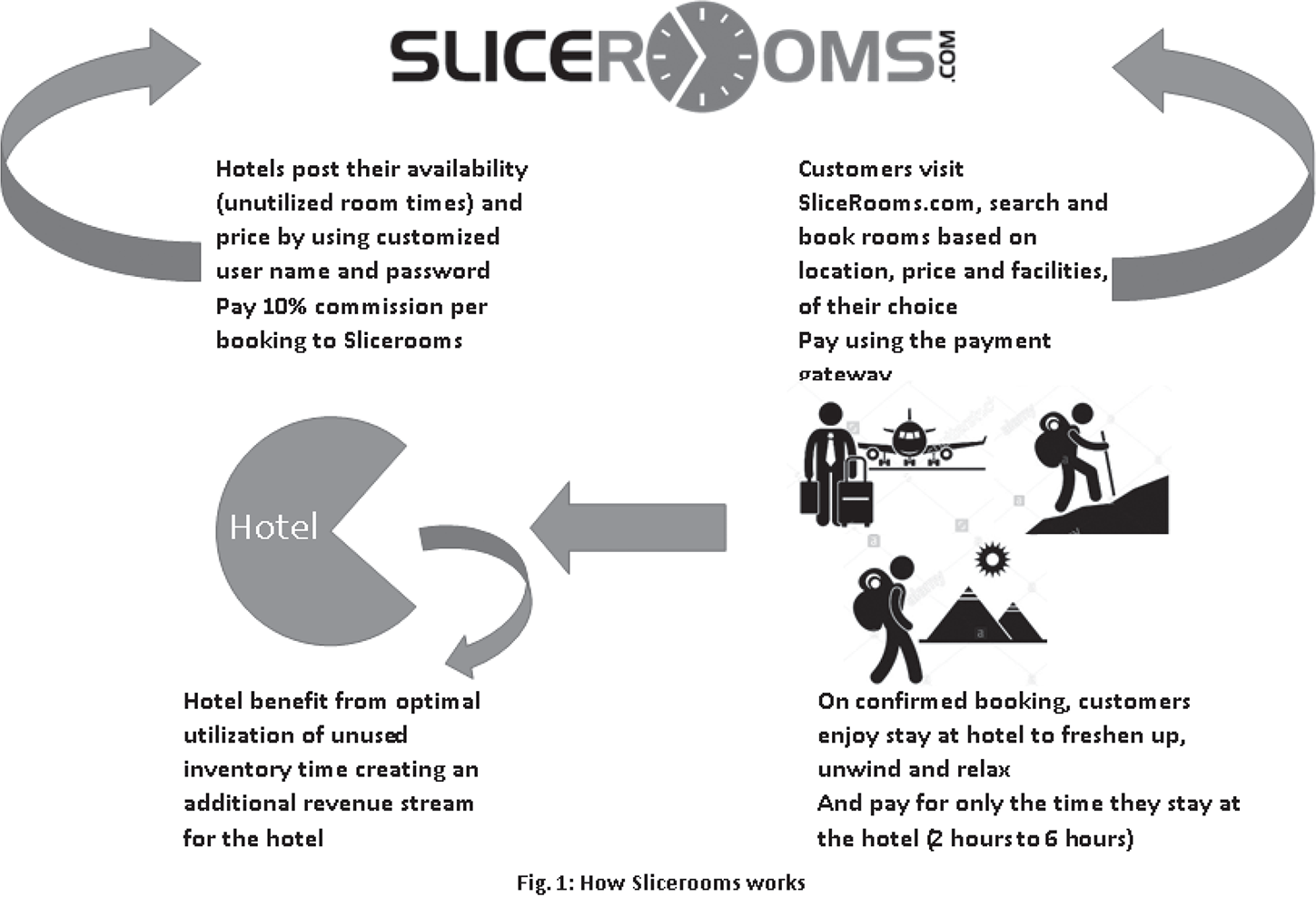
Fig.1: How Slicerooms works
SliceRooms has a robust, asset-light business model with no inventory buying or a minimum guarantee with hotel owners. Dynamic pricing of tariffs on an hourly basis provides the customer with the comfort to pay only as per use. It is also examining tertiary revenue streams like banquets and marketing tie-ups for lead generation which would further enhance its own revenue. The potential to scale up with minimum investment is significant. It already has a presence in over 20 locations with a considerable footprint in South India. It has currently tie-ups with 400 hotels.
Hotels register themselves on the SliceRooms website to allow listing of their rooms and reach a wider customer base. Every hotel in the SliceRooms network is advised to follow a dynamic pricing methodology.
SliceRooms operates through a website which lists hotels in the SliceRooms network with an option for any new hotels to tie-up through an “Add your hotel” button. Based on the customer requirement selected via a custom search, hotel rooms with a rating of 1 to 5 stars are displayed with details of facilities. The first-two-hour pricing with pictures of the property are also shown. Customer makes bookings as desired and pays only for the duration of stay and not for the entire day. On confirmation of time of arrival and departure by the customer and confirmation of availability by the hotel, rooms are allotted and tariff is paid through an online payment gateway. As mentioned earlier, a 10% commission fee per booking is charged on payment (via online payment gateway/on arrival/check out), which is the primary revenue for SliceRooms.
THE DILEMMA
The prognosis for micro stays is promising. That the concept of micro stays has caught popular imagination is not a mirage. Hotels have realized the addition this would make to their bottom line. For instance, Lemon Tree Hotel, Chennai displays the tariff prominently for a day-use room on their website. The 4-hour package for a business room with free Wi-Fi is on offer at INR 1,699/-plus taxes and the 8-hour package at INR 2,199/-. Contrast this with the non-refundable tariff of INR 3,999/- with free Wi-Fi and buffet breakfast.
SliceRooms is aware that marketing efforts have to be expended on multiple fronts. There is a need to sign up with hotels for inventory and build a consensus on pricing and the commissions, even as they reach out to the target customer.
Laxman now ponders what should be the go-to-market strategy. Among other decisions, he is debating the duration of the slice / micro stay. Should it be any number between two and six hours? What base rate should be charged for the micro stay? What then should be the duration of the extended stay beyond the base duration? What price should he charge for the extension? He also notes that while upscale and upper-upscale hotels in developed nations have adopted the micro stay concept, India is yet to catch up. But he is confident it will!
